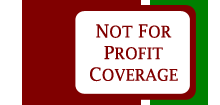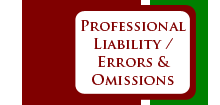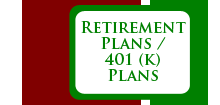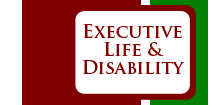|
Carnegie Financial
brings you complete solutions for an
employer’s retirement plan needs:
 |
An analysis of your company’s employee
demographics to help determine the type of plan that will deliver
the best results for you
|
 |
The necessary plan documents to set-up
and administer a 401(k) or profit-sharing plan
|
 |
A wide range of investments from one of
our trusted partners.
|
 |
Ongoing support and annual testing to help ensure
that your plan maintains its tax-qualified status with the IRS.
|
Looking for cost-effectiveness with greater
returns in your 401k?
Why Director(sm) for Your Retirement needs?
401k Toolbox -Options for every investor
401k Basics
What is a
401k?
In simple
terms, the 401k is a retirement plan in which employees are allowed to
contribute money before taxes are assessed. Some employers also provide
participants with matching funds to the employee's 401k account as part
of their benefits package. The employee may have the option of selecting
specific investment options for the money in their 401k account. Besides
building retirement funds, contributing to your 401k reduces your
taxable income and helps you keep more of your hard-earned money. 401ks
are widely regarded as an excellent financial tool and means of building
your pension for retirement.
Who can participate?
If your
employer offers a retirement plan that qualifies under 401k laws and you
are a full-time employee then you may participate.
How
does it work?
Generally payments are auto-deducted
from your paycheck into your retirement account. Your balance is
invested according to the specifications made when you joined the plan.
If your employer provides matching funds, this part of your account
balance may not be available for some number of years after which it
becomes part of your vested balance.
Your 401k money is not taxed until you withdraw it,
so if you've retired, you will likely be in a lower tax bracket which
results in less money going to the tax man. Also your money grows faster
though the power of tax-deferred compounding interest.
Since 401k contributions are
typically made directly from your paycheck, saving for retirement is
made easy. It is even possible to take out a loan against your 401k
account balance, and the best part is that any interest that you would
be paying on the loan won't go to a bank, it will be deposited into your
account along with the repaid principal. Be sure that you are prepared
to leave this money alone, since there is a 10% penalty for early
withdrawal and you will be liable for the deferred income taxes.
SEP IRA
(for self employed
individuals and small business owners)
What is a SEP IRA?
SEP IRA (Simplified Employer Pension
Plans) are retirement plans that are ideal for small business owners and
self employed individuals such as independent contractors (IRS Schedule
C). SEP IRA plans allow a much larger contribution (up to $40,000
annually in 2004) than a Traditional or Roth IRA with a comparable
amount of paper work.
SEP IRA for a self employed individual
with no employees.
Contributions of up to 25% of earned or
net income up to a maximum of $40,000 annually can be made into a SEP. A
contribution to a SEP IRA is a tax deductible expense.
Self employed individuals with less than
$150,000 of net income who would like to contribute the full $40,000 but
are limited by the contribution rules of the SEP may want to consider a
Solo 401k
(Individual 401k) to maximize their tax deductions.
SEP IRA for a small business owner with
employees.
With a SEP, contributions are made by
the employer (employees do not contribute). All eligible employees have
their own individual SEP accounts and annual contributions are made by
the employer to the employer's SEP as well as to any eligible employees'
SEP accounts. The employer can elect to contribute between 0% to 25% of
compensation and the percentage of contribution can vary annually at the
employer's discretion. The employer and all eligible employees must
receive the same fixed percentage. The annual contribution made by the
employer is tax deductible.
Who is considered to be an eligible
employee?
Employers must make contributions to
employees if they meet the following 3 requirements:
-
21+ years old
-
Have at least 3 years of service in last 5 years
-
Have earned at least $450 in compensation from the employer for the
year.
Employers who would like to sponsor a retirement plan for
their employees but are financially unable to make contributions on
their behalf may want to consider a 401k. With a 401k, employers are not
required to contribute and contributions can be made solely by
employees.
|









